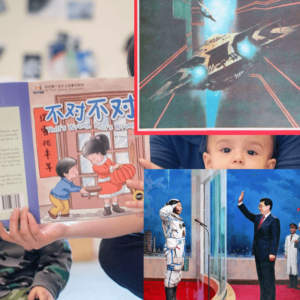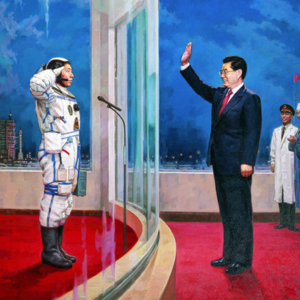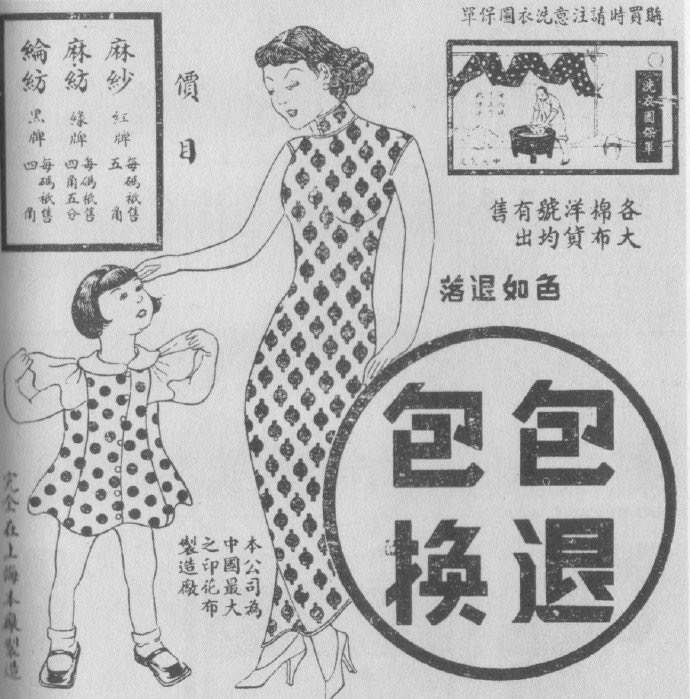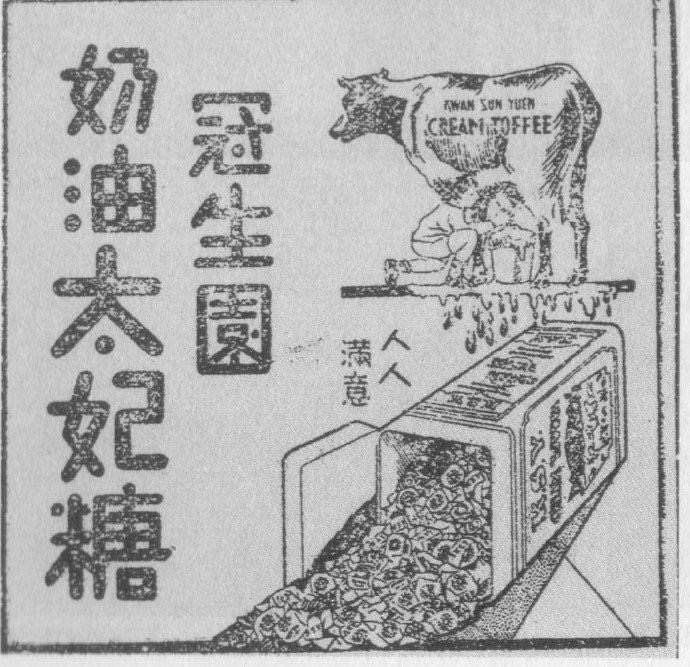
“…the very Russian tactic of saying nothing and doing exactly what you were planning to do after being told unequivocally that you were forbidden to do it.”
contents
- comic strips avant la lettre: on presentism and comics studies
- the fate of chinese socialism: ufology with chinese characteristics
- unpopular opinion: studying chinese is a great investment in your future!
- this week in history: 690, 1950, 1328
- colophon: reading, writing, listening

comic strips avant la lettre: on presentism and comics studies (permalink)
Last week, I received some comments from a reader of my blog regarding my description of the central question of my PhD research as:
How can we, from the perspective of the present, make post-Mao lianhuanhua [comic books] intelligible? The reader warned that this position could be interpreted as an expression of “presentism.”
In light of this, I thought I might share some of my thoughts on this topic in the form of a short essay:
https://www.nickstember.com/presentism-and-comics-studies/
In the post, I provide my understanding of the concept of presentism, and how I see it relating to comics studies in China, and elsewhere as well. The post isn’t too long, but I thought I would also provide a tldr here to summarize my key points.
As I understand it, presentism refers to the concern that when writing about the past, we may end being unduly influenced by the values and interests of our own historical moment. This is problem because as historians we are expected to not only accurately record historical events; but we are also asked to interpret the motivations of the historical actors responsible for those events.
Getting the first part right is relatively straightforward (pre-Covid, at least): go to the archives, and use reputable primary sources to piece together an objective narrative that either agrees or disagrees with what others have said about the events in question.
(Hayden White might disagree about whether any narrative can truly be said to be ‘objective’, but that’s a topic for whole other essay.)
The second part, where we apply our subjective interpretations of why certain people acted the way they did, is usually where concerns about presentism come in.
As I argue in my essay, presentism is foundational to comics studies, because the term “comics,” as we use it now, emerged gradually. Originally “comics” referred to humorous publications, only later coming to refer to the “picture stories” included within.
So even when we can trace a direct line of genealogical descent from “picture story” to “comic strip,” it is unavoidably anachronistic to discuss the emergence of “comic strips” avant la lettre.
This hasn’t stopped people from doing it, though. Just last week, Dirk Vanderbeke made his case for comics-before-comics over at The Comics Journal:
In discussing one of my favorite examples by Umberto Eco, who describes a Gothic cathedral as a “great book in stone […] the mystic comic strip that must narrate and explain everything…”
…I break down some of the problems we can get into not only when we push these sorts of metaphors too far, but even when we try to compare “comics” traditions in different countries.
Finally, I turn to my own work on Chinese comics (manhua and lianhuanhua), and show that even within a single county what we mean when we say “comics” needs to be contextualized for the time period we are discussing.

the fate of chinese socialism: ufology with chinese characteristics (permalink)
Yesterday, @MIC_Journal posted a fascinating essay from their latest issue by Malcolm Thompson on the birth of UFOlogy in early Reform era China:
Founded as the China UFO Enthusiasts’ Liaison Office 中国UFO爱好者联络处 at Wuhan University on 20 September 1979, the following year, this organization would be renamed the China UFO Research Association 中国UFO研究会 (CURA), publishing the Journal of UFO Research 飞碟探索, and eventually establishing some 40 offices across China.
As Thompson discusses, UFOlogy in China would become linked with the state-level All-China Qigong Science Research Association 中华气功科学研究会 (QSRA), founded under the auspices of leader members of the scientific community such as Qian Xuesen 钱学森.
Qian holds the dubious honor of having helped China not only build its first atomic bomb, but also was a key proponent of the one-child policy based on neo-Malthusian scaremongering about the “population bomb.”
“By the early 1990s” writes Thompson, “the broad project of combining Chinese traditions like qigong with high-level science and technology 高阶科技 in the interest of economic development was [intersecting with] the popular mass movement known at the time as Qigong Fever 气功热…”
“Among other things, charismatic Daoist masters would distribute their healing qi to their followers via electronically mediated speech at rallies of thousands or even tens of thousands of people, many of whom fell into collective trances or were healed of injuries or ailments.”
UFOlogy and Qigong, it seems, were a match made in heaven, allowing for “the organic combination of Eastern qigong culture with Western modern science” 东方气功文化与西方现代科学的有机结合 .”
It’s some wild stuff:
“The principle of flight of flying saucers is yin 隐 (secret, hidden) flight [such that] the speed of light is controlled by thought, causing the moving body to alternate between empty 虚 and full 实 forms, between the manifest 显 and the hidden 隐.”
And:
“The navigation system of flying saucers is the Taiji compass 太极罗盘. In the boundlessness of space, where is the destination? How is navigation accomplished? One must use the Taiji compass to go out to interstellar space distances and time intervals…”
Not everyone at the QSRA was happy with the inclusion of the UFOlogists in their ranks, however, and there were accusations of pseudoscience’ 伪科学. (Incidentally, Falun Gong also apparently belonged to the QSRA for a time in the early 90s, because of course they did.)
Taking a note from Mao, in October 1999, Liu Dongjun published an essay titled “UFO Research Must Have Chinese Characteristics” UFO研究必须具有中国特色, advocating “methods resembl[ing] nothing so much as a socialist developmentalist-era mass campaign.”
For example:
“In the boundless universe, nothing is so bizarre that it cannot exist. But no matter how magical it is, as long as it is an objectively existing substance, there will necessarily be laws of transformation for its emergence, development, and decline.”
“Only by using the materialist standpoint and method can we reach conclusions that accord with objective reality and the nature of science.”
Or:
“We must achieve the unity of experts and the masses, set up observation points widely, establish an observational and information network, and lay out a tight nationwide network concentrated on observation and capture.”
As Thompson observes, “Here, the elements of ‘Maoist’ forms of epistemology, practice, and personal commitment are conjoined to a form of science that is, at least in principle, open to any possible future.”
Sadly, Liu’s efforts came to naught, and, according to Thompson, “Chinese UFOlogy, insofar as it officially exists, ceased to differ from the UFOlogy of the History Channel or the glossy UFO magazines in any discernible way.”
Meanwhile, as a legacy of Li Hongzhi’s interest in little green men, the China Anti-cult Association 中国反邪教协会 remains vigilant for the resurgence of geomantic cow tippers.
The essay is (like everything published by the fine folks at Made in China) well worth reading in its entirety. It’s fascinating to speculate about what could have been.

unpopular opinion: studying chinese is a great investment in your future! (permalink)
This summer Tom Mazanec posted the following response to an article in the Economist about the declining popularity of Mandarin as a second language:
“Financial gain is always the worst reason to study a foreign language.”
https://twitter.com/tommazanec/status/1299078124697563136
While it’s a sentiment that I wholeheartedly agree with, as long as I’ve studied Chinese (15 years and counting) people have argued about 1) the right reasons to learn the language and 2) whether it is worth all the time it takes.
Now, obviously I’m biased (cf above) but I find it curious that the way we talk about Chinese is so different from the way we talk about other languages — providing transactional vs emotional justification. The fact you’re far more likely to come across an article about China in the Economist or the Financial Times than you are in (say) the London Review of Books is part of this.
(And the certainly, relatively few Anglophones can wax poetic about their summer abroad in Beijing or Taipei as compared to Paris or Barcelona or even Berlin.)
Pollution and politics are part of this, but just as much, I think, you have to ask some tough questions about how we think about, talk about, and teach Chinese (and other languages too).
How does thinking about language learning in terms of human capital (investment) encourage us to focus on certain ways of interacting with China, and not others?
If we can describe learning Chinese an asset— like a financial product — then can we also describe it as a liability?
How do you quantify a counterfactual? (If I hadn’t learned Chinese, does that mean I could have learned Python instead?)
In my case, I was actually a comp sci major who took Chinese because 1) I thought it would be a good investment in my future and 2) I wanted to see if I could (having learned German, Spanish, and French to varying degrees of fluency previously).
Did I decide to learn Chinese for the wrong reasons? Probably!
But I don’t regret it.
I lucked out, and got to read Chinese history and poetry, learning about how intellectuals way back when dealt with living in periods of dynastic decline. It made me realize that the things me and my friends were worrying about — the War in Iraq, maybe getting drafted someday, climate change — were variations on the things that people like us had always worried about.
But at the same time, the things that made life worth living — good food, good friends, good poems — were pretty much the same.
You might get (or have gotten) something else out of studying Chinese, and that’s okay. The point is, learning a second language not only opens a door into another way of looking at the world, it sets you up to walk through that door.
Maybe you will live in China, maybe you won’t.
Maybe you will translate epic novels, maybe you won’t.
Maybe you’ll give up after a year, that’s fine too.
Whatever happens, you can’t know until you try!

this week in history (permalink)
17 October 690 #1330yrsago – the short-lived Zhou Dynasty established by Empress Wu Zetian ( 624–705)
19 October 1950 #70yrsago – defeat of Tibetan forces by the People’s Liberation Army in the Battle of Chamdo
21 October 1328 #692yrsago – birth of the Hongwu Emperor (d. 1398), founder of the Ming dynasty

colophon (permalink)
h/t: the comics journal, made in china journal, tom mazanec, the economist
reading: attack surface by cory doctorow
writing: my PhD dissertation, low culture fever, a history of chinese comics in the early reform era (1978-1983)
this week’s progress: 2,790 words (40,174 total) #weeklywords
listening: “shoot the moon” – voodoo glow skulls
quotations and images public domain or fair use unless otherwise indicated everything else CC BY 4.0 / free to share & adapt w/ attribution